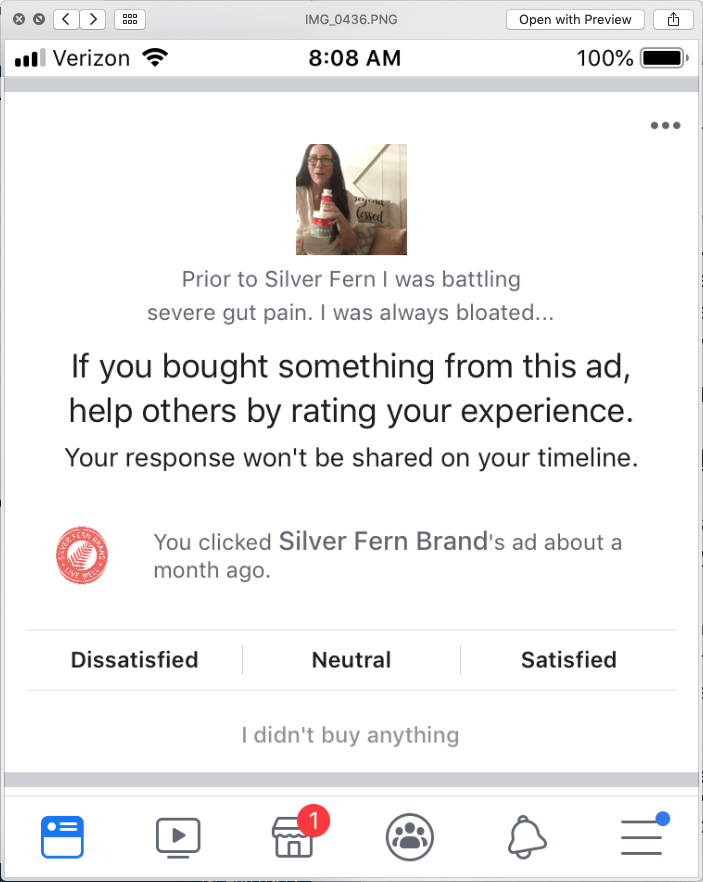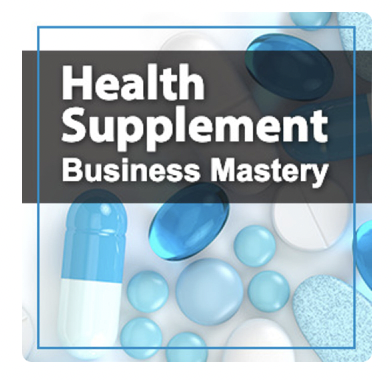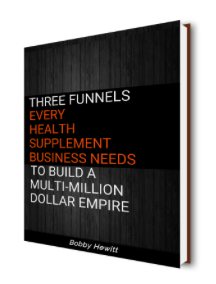A Facebook compliant landing page for dietary supplements is very different than a traditional direct response landing page.
What gets approved for Google Display Network (GDN), Bing or Native Ads is different than what gets approved for Facebook.
You can’t just slap on a Click Funnels theme and be Facebook compliant.
It’s more complicated than that. To make matters worse, Facebook constantly changes its algorithms and policies.
With Facebook controlling such a big share of traffic, you can’t ignore them. That’s where the majority of the 45+ female supplement buying market is online. At least for now.
So dietary supplement marketers have no choice but to play their game.
Up until now, playing the Facebook compliance game has been a bit of a black box. But this article uncovers exactly what you need to change on your landing page to play nice with Facebook. Not just policy compliance issues, but the specifics that many health supplement marketers can’t seem to get right.
For example…
How Deep Does Facebook Look At Your Funnel?
Is it just your landing page that needs to be compliant or does Facebook also care about the next page in your funnel? Do they look beyond the order page at your first up-sell?
This is debatable. As of right now, 2nd quarter of 2019, from what I am seeing with our clients, Facebook is looking at the ad landing page and at least one click further in your funnel.
Yes, the first page a visitor lands on is more important for compliance with Facebook compared to the next page in the funnel. But they are starting to look at that next page. However, it does take Facebook a while to check the next page in your funnel.
If you’re using a compliant pre-sale advertorial page that links to a non-compliant sales page Facebook will stop that funnel from getting traffic because of compliance issues. Both pages need to be Facebook compliant.
One ninja strategy to get around this, at least for now, is to use a quiz. The more clicks you can add in-front of a non-Facebook compliant page the better chances you have of keeping the campaign running. With a quiz there are several questions to answer before getting to the sales page, and each question counts as a click to get to the next step, in the eyes of Facebook. So, the more clicks it takes to get to the sales page i.e. an 8 question quiz takes 8 or 9 clicks, the more you can get away with and be a little bit more aggressive with copy on that page that’s 9 clicks away.
The further you get from the original click the less Facebook compliant you can be.
I do think this will change in the near future. I can see Facebook going deeper into the funnel to ensure compliance, as new tricks become old tricks.
Does Facebook Care About Your Buyers Experience in Your Funnel?
There are Facebook police watching even when you don’t see them.
Facebook surveys your buyers to ensure their buying experience was positive. Facebook is doing this on their own without the advertisers knowledge or permission.
Here’s an example of what your buyer sees in their Facebook feed to check up on you.

Here’s how this works.
You as the advertiser acquire a customer with a Facebook ad. That customer buys from you and then a few days later, Facebook sends them a survey in their newsfeed. Yup Facebook is checking up on you. You can bet if they get too many bad responses then your campaign gets flagged for further investigation.
So, if your new buyer had a bad experience because of too many up-sells or sales tactics that the customer just didn’t like or feels were too aggressive you can be sure that Facebook will be looking further into your funnel and other marketing tactics.
Facebook Compliant Copy For Dietary Supplement Landing Pages
In direct response copywriting, it’s always been best practice to speak directly to the reader to make a personal connection. One way to do that is to use words like “you” and “you’re.” Unfortunately Facebook’s compliance algorithm is specifically looking for those words because they are used in clickbait headlines. This has made the use of speaking directly to the reader a thing of the past when it comes to a compliant Facebook landing page.
Additionally, any language that includes a symptom of a disease state is not allowed. What that means is something like “high blood sugar” is a Facebook compliance no-no. Because high blood sugar is a symptom of the disease diabetes.
Any language that implies a treatment is also not allowed. So the terms “managing” and “sustaining” are also not allowed. For example: “(product name) helps manage blood sugar” or “(product name) is recommended for sustaining healthy blood sugar” both imply a treatment.
In the case of blood sugar or blood pressure it naturally goes up and down. Saying the term “high blood pressure” is crossing a line with Facebook landing page compliance. Instead what is allowable by Facebook is the term “erratic.”
Saying “erratic blood sugar” is allowable because it’s not a disease or a symptom of a disease. Blood sugar is naturally erratic in everyone, since it does go up and down throughout the day as a function of the body.
Additionally, any term that supports sustaining general health is allowed.
As a general guideline, following FDA compliant copy with claims will put you 90% of the way there with Facebook compliance. Facebook does have certain nuances that are different from the FDA general guidelines. To learn more about FDA claims and compliance read my past two articles on dietary supplement claims – what’s allowed and what’s not allowed along with the supporting information in each article.
Facebook Compliant Images
Yes images matter to Facebook. They will say you’re not compliant if they don’t like your images. What they don’t like are negative images, and they get to decide what is negative. Unfortunately if you’re a dietary supplement for weight loss, a negative image includes a person with a few extra pounds.
Facebook Compliant Experiences
The experience your visitor has matters to Facebook. Therefore, exit pops are not allowed for a Facebook compliant landing page. It once mattered if the exit pop was triggered based on intent, like closing the tab (a click to pop), or if it was more “intrusive” in the eyes of Facebook, that triggered when your mouse scrolled out of the main window (an exit intent pop.) The growth of Mobile made this a thing of the past and now Facebook will not allow any type of exit pop at all.
Facebook Compliant Disclaimer
Even your footer disclaimer copy needs to be compliant according to Facebook. Which is different that what is required for Google and native ads. Facebook specifically requires the disclaimer copy on your landing page to include the name of the product you are promoting.
The standard FDA compliant disclaimer is still required, but you also need to be more transparent by specifically including the product name.
The standard FDA compliant disclaimer is:
The products and the claims made on or through this site have not been evaluated by the United States Food and Drug Administration and are not intended to diagnose, treat, cure or prevent disease.
A Facebook compliant disclaimer is one that specifies the product in addition to the standard FDA requirements. For example:
(Product Name Goes Here) claims to support (Compliant Outcome That Does NOT Imply a Treatment or a Symptom of a Disease Goes Here) comes from its ingredients and its ingredient’s respective studies, as well as anecdotal experiences of customers. The products and the claims made on or through this site have not been evaluated by the United States Food and Drug Administration and are not intended to diagnose, treat, cure or prevent disease.
Facebook Compliant Transparency
Overall Facebook compliance means you have to be more transparent.
This means including navigation links somewhere on the page, either in the header or in the footer. There needs to be some way to leave the page and find out more about you.
You must also include a link to a privacy policy, as well as brand related information, address, phone number, email.
Facebook Compliant Landing Page Design
Anyone in the direct response world knows that “ugly” design converts better than “pretty” design.
Or at least that’s what we were taught. I’ve done multiple A/B tests where design alone was responsible for a conversion lift.
Last but not least, for a Facebook compliant landing page, you’ll also need…
A Brand Hub Website
The hub site does not need to be connected to the sales landing page that your Facebook ads are sending traffic.
The purpose of a brand hub website is strictly for the good graces of Facebook. They want to know that your brand is more than just a sales funnel, but has a legitimate brand presence.
All Facebook is looking for here is a website that has your products, a way to buy them, and a bit about who you are as a brand. This site does not and should not be linked to your Facebook traffic funnel. It lives as a separate, very compliant brand-centric website.
Facebook Ad Management
In addition to designing your landing page for Facebook compliance. You shouldn’t overlook the management of your Facebook ads.
First off, it’s always a good thing to have a Facebook ad rep. Many people think they have a Facebook ad rep when they don’t. Because, Facebook does not technically have ad reps.
Agencies and businesses can become Facebook Marketing Partners. Which gets you access to technical support, partner-only programs, training and more. This is the only “in” to someone at Facebook that you can talk to if your campaign gets slapped for compliance issues.
I can’t stress the importance enough of working with a traffic agency that is a Facebook Marketing Partner for the stability of your campaign.
In addition to a well managed campaign, monitoring and responding to all comments in your ad post is vital. Facebook does look to see if you are actively answering questions and engaging with comments. If you don’t respond to ad post comments, the performance of your campaign will go downhill, leaving you scratching your head, wondering why it’s not working any more.
A Necessary Evil
Following these Facebook landing page compliant guidelines will absolutely hurt conversions, no doubt. But as dietary supplement marketers, we’re forced to play Facebook’s game.
When it comes to online traffic, Facebook is the 800 pound gorilla, at least for now.
For the time being, watered down direct response selling is the only way to continue to get Facebook traffic. The watered down compliant approach is working for many direct response health brands. But I can see that coming to a very quick end as similar offers flood the Facebook marketplace. As this happens, the marketplace sophistication level will rise even higher in an already highly sophisticated audience.
The real issue is that the selling methods that made direct response so great are being amputated by Facebook, leading to a race to the bottom of profit margin. All we’ll be left to compete with will be price because of watered down marketing.
Discover the 3 funnels that can help your health supplement business succeed.

Listen to the Health Supplement Business Mastery Podcast for for dietary supplement entrepreneurs and marketers.



